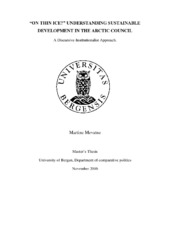| dc.description.abstract | The thesis investigates the institutional approach" to sustainable development in the Arctic Council. What has been called the institutional approach is conceived of along two dimensions 1. The institutional dimension; and, 2. The ideational dimension. This means that both institutional arrangement around the thematic area, and the substance of sustainable development as an idea has been analysed. This corresponds to the dimensions in discursive institutionalism. The dimensions of the policy arrangement approach have structured the empirical investigation: political modernisation, rules of the game, actors and discourse coalitions, power and influence, and discourse and policy programmes. The data material consists of documents from the Arctic Council online document archive, as well as secondary sources. The thesis finds that the Arctic Council has strongly contributed to region building and facilitating a cooperative environment for Arctic governance. The development of a clear strategy on sustainable development is more challenging. Much like the concept of sustainable development itself, its interpretation in the Arctic Council can be said to maximise consensus rather than clarity. This challenge is further amplified by the separation of sustainable development and environmental protection as two founding pillars of the Council. The Arctic Council has generated large amounts of scientific research and assessments, and identified important gaps in knowledge. It has not gone as far in outlining consequences for policy, long-term strategies and policy recommendations. Sustainable development as an idea in the Arctic Council takes a similar form as the mainstream Brundtland definition, with an added focus on culture, health and indigenous issues. In relation to climate change, the focus is almost exclusively on adaption, which can serve to shift the discussion away from connections between the dimensions of sustainable development. In a changing Arctic where actors are unsure of the future and their interests in it, the function of the Arctic Council is an open and empirical question. As a loosely organized high-level forum, the Arctic Council is what its actors make of it. | en_US |
